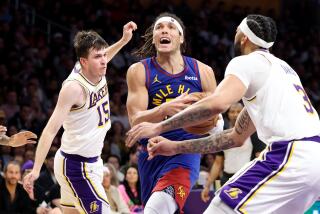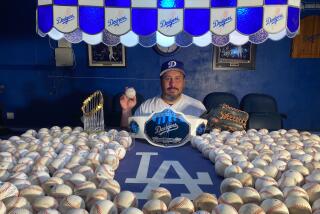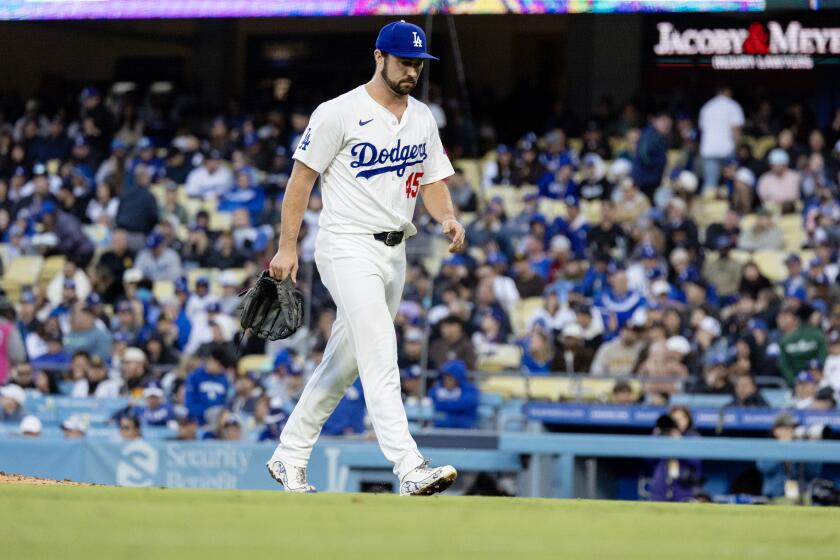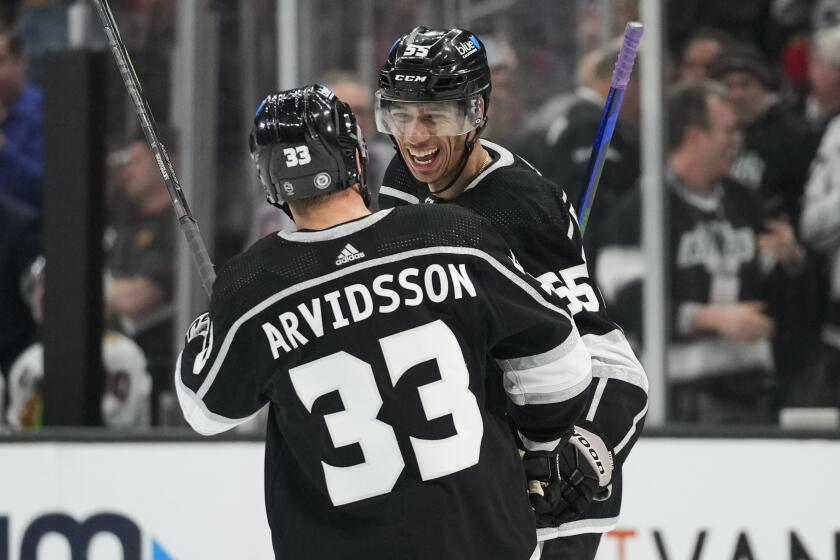Ellis is trying to strike back at tough foe
The man who spoke out so clearly against racism in baseball talks softly now, his voice weakened by chronic pain and fatigue.
“I was diagnosed with cirrhosis of the liver the day after Thanksgiving,” Dock Ellis said, “and from there I’ve been a little foggy because I went down about 12 times.”
Down, but not out.
Not Dock Phillip Ellis Jr., who has done enough good in this world to be remembered for more than the folly of being high on LSD while he pitched a no-hitter for the Pittsburgh Pirates against the San Diego Padres on June 12, 1970.
Cirrhosis -- commonly but not exclusively caused by alcohol or hepatitis -- has withered his once powerful 6-foot-3, 210-pound body. On Monday, he was put on a list for a liver transplant.
Ellis, 63, doesn’t leave his Apple Valley home much except for doctors’ appointments or when his son, Dock III, takes him to the gym or whirlpool.
“I can’t stand to see me with all the weight I’ve lost,” he said.
He doesn’t have health insurance, but friends have tamed the mess of his medical bills. David Reich, son of Ellis’ former agent, Tom Reich, paid for his examination Monday at UCLA. Reich said that Randy Levine, New York Yankees president, has pledged help, as have friends who want anonymity.
Other friends call constantly to encourage Ellis, who has been clean and sober since 1980 and has helped countless people fight the same fight.
“As a human being they really don’t come any better,” said Al Oliver, a former Pirates teammate, now a Baptist deacon and motivational speaker in Ohio.
“I had a chance to play with the great Roberto Clemente, and he was for real. So is Dock.”
Ellis, a Los Angeles native and graduate of Gardena High, won 138 games and lost 119 from 1968 through 1979 for five big league teams. He played on the Pirates’ 1971 World Series championship team and on the 1976 Yankees’ team that lost the Series to the Cincinnati Reds.
He was quirky -- he went on the field wearing hair curlers in August 1973 after Ebony magazine published a story on his many hairstyles -- and he was combative.
Incensed that the Reds were bullying his Pirates, he hit Pete Rose, Joe Morgan and Dan Driessen in succession on May 1, 1974, and tried to hit Tony Perez but missed. After aiming two pitches at Johnny Bench’s head he was pulled.
“He didn’t want any other clubs to intimidate the Pittsburgh Pirates,” said Tony Bartirome, who spent 35 years with the club as a player, coach and trainer.
Ellis battled everyday injustices with the same ferocity.
While in the minor leagues, he raced into the stands to confront a racist heckler. In 1971, he dared the powers that be to designate him the National League’s All-Star starter by noting that Vida Blue was starting for the American League and declaring baseball would “never start two brothers against each other.”
Ellis started, his only All-Star appearance.
He didn’t shrink from other, tougher battles.
He had begun drinking and using drugs in high school; in the major leagues he started popping pills, not an uncommon clubhouse practice then. Yet, while playing for the Pirates and still using, he counseled substance abusers at Pittsburgh’s Western State penitentiary.
Later, he started a foundation for sickle cell anemia research, ran a drug counseling center in Los Angeles and counseled prisoners in Adelanto.
“He’s done so much more than just turn his life around. He has helped so many others turn their lives around too,” said Joe Safety, a vice president of the Clippers and former Pirates executive who has known Ellis since 1976.
“He’s a most remarkable person. He has had an amazing impact on a lot of lives.”
Including Ellis’ own, after he checked into rehab 28 years ago.
“I just stopped,” he said. “I went into treatment and I understood treatment. There was a big old redheaded dude in my face every day and he had a lot of experience with what I was going through.”
Ellis paused.
“He later killed himself,” Ellis said. “I know the bridge he died under. Some of us live. Some of us don’t make it.”
Ellis made it even though baseball shunned him but for a brief term in 1990 when he essentially baby-sat troubled Yankees pitcher Pascual Perez.
He wasn’t surprised by the snub. Jackie Robinson, he said, used to send him notes commending his honesty but saying he talked too much for the comfort of management.
“He knew there were things I wasn’t going to get because I was outspoken,” Ellis said. “Baseball wasn’t ready for me.”
That was the game’s loss.
“He could have helped a lot of young pitchers in the Pittsburgh organization,” Bartirome said. “He was a Pirate from the beginning and he always wanted to be a Bucco. He should have been able to work with pitchers until he couldn’t or didn’t want to do it anymore.”
Ellis has good and not-so-good days now but always tries to talk to friends. “I’m the guy that everybody calls for numbers,” he said. “You want to know where in the world anybody is, you’d call me.”
And they do. Bartirome, who lives near the Pirates’ spring-training home and Gulf Coast League team in Bradenton, Fla., says he prays for Ellis everyday and thinks of him more often than that.
“I sit in the stands at 9:30 every morning, all by myself, and look for another Dock Ellis and Willie Stargell,” Bartirome said.
“He’ll come back. He’s a tough son of a gun.”
--
Helene Elliott can be reached at helene.elliott@latimes.com. To read previous columns by Elliott, go to latimes.com/elliott.
More to Read
Get our high school sports newsletter
Prep Rally is devoted to the SoCal high school sports experience, bringing you scores, stories and a behind-the-scenes look at what makes prep sports so popular.
You may occasionally receive promotional content from the Los Angeles Times.







